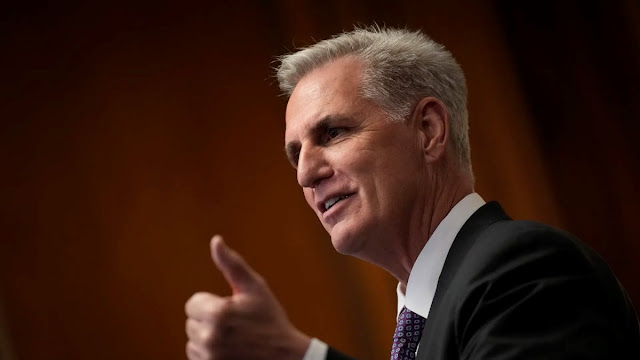House passes bill to raise debt ceiling into 2025

01 de junio de 2023 (08:42 h.)
House Speaker Kevin McCarthy during a Wednesday night news conference after the House passed the debt ceiling bill, called the Fiscal Responsibility Act. Photo: Drew Angerer/Getty Images
The House voted Wednesday to pass a bill raising the debt ceiling until 2025 in exchange for measures to cut the budget deficit.
Why it matters: The bill's passage puts the U.S. on track to avert a debt default — which Treasury Secretary Janet Yellen projected could happen in a matter of days.
Driving the news: The bipartisan agreement between President Biden and House Speaker Kevin McCarthy (R-Calif.) passed 314-117, with 149 Republicans and 165 Democrats voting for it.
What they're saying: Biden said in a statement after the vote on Wednesday night that the House had taken "a critical step forward to prevent a first-ever default and protect our country’s hard-earned and historic economic recovery."
He said the bill was a bipartisan compromise that's "good news" for the American people and the U.S. economy. "I urge the Senate to pass it as quickly as possible so that I can sign it into law," Biden added.
Meanwhile, McCarthy said after the vote: "Tonight we all made history. ... Is it everything I wanted? No. But sitting with one House, with a Democratic Senate and a Democratic president who didn't want to meet with us — I think we did pretty dang good for the American public."
Details: The agreement would raise the debt ceiling until January 2025, essentially punting the issue until after the 2024 election. It also includes a number of provisions geared toward deficit reduction:
Spending: Keeps non-defense discretionary spending in the 2024 budget roughly steady at 2023 levels and caps growth in the 2025 budget at 1%.
Defense: Codifies the Biden administration's request for $886 billion for the Pentagon, a roughly 3 percent increase.
Supplemental Nutrition Assistance (SNAP): Expands food assistance work requirements to able-bodied adults until the age of 54, but exempts the homeless, veterans and some former foster youth. The work requirements phase in over three years and sunset in 2030.
Temporary Assistance for Needy Families (TANF): Slightly reduces state grants for direct cash assistance to families in poverty.
Permitting reform: Streamlines the environmental review process to speed up approval for new energy projects.
PAYGO: Mandates the executive branch to offset significant expenditures with spending reductions ("pay-as-you-go"), but allows them to waive the requirement in certain cases.
COVID aid: Rescinds roughly $27 billion in unspent COVID aid to public health, infrastructure and disaster relief programs, to be reallocated for n0n-defense discretionary spending.
By the numbers: The bill would reduce budget deficits by $1.5 trillion over the next 10 years, according to a report from the Congressional Budget Office.
Counterintuitively, according to the CBO, the number of SNAP recipients would be increased by 78,000 due to the new exemptions, increasing spending on the program by $2.1 billion.
What we're watching: Senate Majority Leader Chuck Schumer (D-N.Y.) has pledged to bring the bill to the floor for a vote as soon as possible, saying on Wednesday morning: "It is imperative that we avoid a default."
Senate Minority Leader Mitch McConnell (R-Ky.) in a statement called on senators after the House bill passed Wednesday night "to pass this agreement without delay."
Go deeper... Scoop: Jeffries, McCarthy cut side-deal to save debt ceiling bill
Editor's note: This article has been updated with comment from President Biden, House Speaker Kevin McCarthy, Senate Majority Leader Chuck Schumer and Senate Minority Leader Mitch McConnell.
Share on facebook (opens in new window)
Share on twitter (opens in new window)
Share on linkedin (opens in new window)
Share on email (opens in new window)
